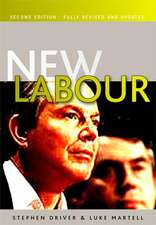Political Negotiation: A Handbook
Editat de Jane Mansbridge, Cathie Jo Martinen Limba Engleză Paperback – 30 noi 2015
Polarization. Partisanship. Rancor. Character assassinations. Government shutdowns. Why can't our elected officials just get along and do their jobs?
The United States was once seen as a land of broad consensus and pragmatic politics. Sharp ideological differences were largely absent. But today politics in America is dominated by intense party polarization and limited agreement among legislative representatives on policy problems and solutions.
Americans pride themselves on their community spirit, civic engagement, and dynamic society. Yet, as the editors of this volume argue, we are handicapped by our national political institutions, which often—but not always—stifle the popular desire for policy innovation and political reforms.
Negotiating Agreement in Politics explores both the domestic and foreign political arenas to understand the problems of political negotiation. The editors and contributors share lessons from success stories and offer practical advice for overcoming polarization. In deliberative negotiation, the parties share information, link issues, and engage in joint problem solving. Only in this way can they discover and create possibilities, and use their collective intelligence for the good of citizens of both parties and for the country.
The United States was once seen as a land of broad consensus and pragmatic politics. Sharp ideological differences were largely absent. But today politics in America is dominated by intense party polarization and limited agreement among legislative representatives on policy problems and solutions.
Americans pride themselves on their community spirit, civic engagement, and dynamic society. Yet, as the editors of this volume argue, we are handicapped by our national political institutions, which often—but not always—stifle the popular desire for policy innovation and political reforms.
Negotiating Agreement in Politics explores both the domestic and foreign political arenas to understand the problems of political negotiation. The editors and contributors share lessons from success stories and offer practical advice for overcoming polarization. In deliberative negotiation, the parties share information, link issues, and engage in joint problem solving. Only in this way can they discover and create possibilities, and use their collective intelligence for the good of citizens of both parties and for the country.
Preț: 282.96 lei
Nou
Puncte Express: 424
Preț estimativ în valută:
54.15€ • 56.33$ • 44.70£
54.15€ • 56.33$ • 44.70£
Carte tipărită la comandă
Livrare economică 14-28 aprilie
Preluare comenzi: 021 569.72.76
Specificații
ISBN-13: 9780815727293
ISBN-10: 0815727291
Pagini: 248
Dimensiuni: 152 x 229 x 18 mm
Greutate: 0.41 kg
Editura: Brookings Institution Press
Colecția Brookings Institution Press
ISBN-10: 0815727291
Pagini: 248
Dimensiuni: 152 x 229 x 18 mm
Greutate: 0.41 kg
Editura: Brookings Institution Press
Colecția Brookings Institution Press
Notă biografică
Jane Mansbridge is Adams Professor of Political Leadership and Democratic Values at the Malcolm Wiener Center for Social Policy, Kennedy School of Government, Harvard University. Her books include Deliberative Systems, coedited with John Parkinson (Cambridge, 2012), Beyond Adversary Democracy (Chicago, 1983), and the award-winning Why We Lost the ERA (Chicago, 1986).
Cathie Jo Martin is a professor of political science at Boston University and former chair of the Council for European Studies. Her book, coauthored with Duane Swank, The Political Construction of Business Interests: Coordination, Growth and Equality (Cambridge, 2012) won the David Greenstone book prize from the Politics and History section of the American Political Science Association. She is also the author of Stuck in Neutral: Business and the Politics of Human Capital Investment Policy (Princeton, 2000).
Cathie Jo Martin is a professor of political science at Boston University and former chair of the Council for European Studies. Her book, coauthored with Duane Swank, The Political Construction of Business Interests: Coordination, Growth and Equality (Cambridge, 2012) won the David Greenstone book prize from the Politics and History section of the American Political Science Association. She is also the author of Stuck in Neutral: Business and the Politics of Human Capital Investment Policy (Princeton, 2000).
Descriere
The United States was once seen as a land of broad consensus and pragmatic politics. Sharp ideological differences were largely absent. But today politics in America is dominated by intense party polarization and limited agreement among legislative representatives on policy problems and solutions.
Americans pride themselves on their community spirit, civic engagement, and dynamic society. Yet, as the editors of this volume argue, we are handicapped by our national political institutions, which often— but not always—stifle the popular desire for policy innovation and political reforms.
Political Negotiation: A Handbook explores both the domestic and foreign political arenas to understand the problems of political negotiation. The editors and contributors share lessons from success stories and offer practical advice for overcoming polarization. In deliberative negotiation, the parties share information, link issues, and engage in joint problem solving. Only in this way can they discover and create possibilities, and use their collective intelligence for the good of citizens of both parties and for the country.
Americans pride themselves on their community spirit, civic engagement, and dynamic society. Yet, as the editors of this volume argue, we are handicapped by our national political institutions, which often— but not always—stifle the popular desire for policy innovation and political reforms.
Political Negotiation: A Handbook explores both the domestic and foreign political arenas to understand the problems of political negotiation. The editors and contributors share lessons from success stories and offer practical advice for overcoming polarization. In deliberative negotiation, the parties share information, link issues, and engage in joint problem solving. Only in this way can they discover and create possibilities, and use their collective intelligence for the good of citizens of both parties and for the country.


















